In the last years we experienced the rise of many new political movements, which gained influence, and even power, in many countries across Europe. This development changes the whole context of the Euro crisis, the migrant topic, but also some fundamental and systemic questions, such as the European social and economic policies. In this article, I want to present you some of those relatively new political forces in Europe, with which European politics will have to deal in the present and near future. It is difficult to determine if those movements will stay for a longer period of time or not. It will depend on the behaviour of the political establishment and the evolution of the European context.
In the last few years Europe experienced the rise of many populist movements and political parties. This phenomenon applies to left wing as well as to right wing movements. But what are the reasons for this development? Is there a connection between the election of Syriza in Greece and the rise of the Front National in France? What are the differences between the left-wing and the right-wing anti-establishment parties?
To treat all these aspects I will choose 4 examples. Like Syriza, one of the most famous anti-austerity movements in Europe. It won two elections in 2015 and the European newspaper headlines in spring 2015 were filled, almost exclusively, by it. Another one, and relatively new movement described in this article, is Podemos. It has to prove its persistence in the upcoming elections in Spain at the end of the year. The other two, the Front national in France and the Freiheitliche Partei in Austria, are already important and opinion-forming parties in their countries.
To start I will try to explain their current strength and popularity in many countries.
After the shock of the euro crisis and the following debt crisis in southern Europe, there was kind of a political consensus in European political establishment on how to deal with this issue. The leading politicians, in particular Angela Merkel, promoted a strict austerity plan and forced the countries with high debt and low economic performance to apply it. However, there was a strong opposition to this policy and after a while anti-austerity parties and movements gained strength in almost all of these countries. Either there was the formation of new parties/movements, like in Spain with the Podemos-movement, or the strengthening of existing, though relatively small parties like Syriza in Greece.
The second reason seems to be that in the last decades, the neoliberal economic system was the leading concept in world trade and economy. Even the social-democratic parties became (strong) defenders of this ideology. They believed the dangerous slogan “there is no alternative” and didn’t see neoliberalism as one ideology among many others, but as the normal, natural state, how it has to be and how the world works. However, there were many “globalization losers”, people who cannot benefit from today’s fast-paced, mobile and international economic and social system, who did not see an alternative to vote for within the major parties in their countries, because almost all of them supported (more or less) the same system. With this development many people became extremely frustrated and apolitical. They felt like the political and social elites are abandoning them. As consequence, the new populist and anti-establishment parties, it doesn’t matter if left- or right-wing, are trying to fill this gap and to attract those frustrated voters.
In addition many people are not only opposed to economic globalization and liberalism but also to social and cultural globalization, such as migrant movements and, in their opinion, American cultural hegemony. They are often opposed to and/or afraid of liberalism in all its forms. Whether it is the emancipation of minorities (such as homosexuals) and women, economic and social mobility (for example migrant workers) or a multicultural and progressive society.
Both, the right-wing and the left-wing parties, are opposed to the current policies of the EU and they criticize the Union, the influential politicians of the same and especially the current German hegemony. But in contrary to the right-wing anti-EU parties, which are nationalist and opposed to supranational institutions per se, and the European integration especially, the left-wing parties are not opposed to the formation of a supranational European union, or even a state-like entity. They do not criticize the Union and the integration as an idea, but the way the EU develops and the neoliberal economic and trade system currently applied in the EU (e.g. TTIP, austerity, powerful banks). They criticize the EU as an institution which only goal is the implementation of neoliberal policies in all its member countries.
One reason of the success of those parties is the dissatisfaction of the people with the political establishment. In Austria the current government is formed of a “big-coalition”, which means a government composed of the two major parties, which are the social-democratic “SPÖ” and the conservative “ÖVP”. Between world war two and the mid-80’s these two parties gained together at least 80 % of the votes in the general elections. In the 2013 elections both of them together gained 50,8% of the votes. There was a continuous decline since the mid-80’s, which was compensated by the rise of the far-right FPÖ, which received 20,5% of the votes in 2013, and would gain up to 30% if there were elections right now, according to the polls in Austria.
One reason for this decline is the coalition of the two big parties because it is difficult to reach consensus and bring change if two opposed parties work together. Many people are frustrated of the political standstill and the obsolete structures in the system. They vote for the FPÖ as a form of political protest. Another point is the media covering of the euro-crisis and the politics of the EU in general. The biggest newspaper in Austria, which is called “die Krone”, is a populist tabloid newspaper, which is often opposed to the policies of the EU and agrees with the far-right party. It reaches up to 3 Mio. people in a country of 8 Mio. Inhabitants, which makes it, in relation, one of the most powerful newspapers in the world.
In France the Front National experiences a strengthening since the 1980’s. But It can be explained by the structure of the current political system that it is not yet that well represented in French national political institutions (assemblée nationale, presidency). However, not long time ago, the party reached the second tour of the presidential elections, where their candidate lost against Jacques Chirac, who became president. Furthermore, it is the leading party in the current polls for the next presidential election. Much can change until then but if there won’t be a big shift in French and European politics there might be a FN president in the Elysée palace after the next election. Although one must not forget that there are most probably two rounds in the presidential election, and the second round would be hard to win for a Front national candidate against a more moderate opponent from the socialists or the conservatives.
However, in the elections for the European parliament in 2014 the Front National already gained the most votes in France, with almost 25%. Even though, one reason for this stunning number was the very low voter participation then, which usually favours extremist parties, as multiple studies have shown.
One problem is the economic decline of France and the incapability of the two traditional big parties, socialists and conservatives, to deal with this issue.
In Spain, the traditional two-party system (socialists and conservatives) is challenged by the new movement Podemos. Podemos is a classic anti-establishment and anti-status quo party with a left-wing program. One important point is its opposition to the current austerity measures in Spain. It is the child of big protests in Spain in 2011/12, which opposed the traditional two-party system in Spain, corruption in the political establishment and the austerity program, which was implemented by the government, and became relatively strong very quickly with up to 26% in the polls in spring 2015. Since then they experience their first decline in the polls and are currently at around 15%. In the Spanish municipal elections in May 2015, they formed alliances with other left-wing parties. In many Spanish cities, such as Madrid and Barcelona, the candidates they supported won the elections and became the new mayors. After this major shift in Spanish politics everything seems possible to the new left-wing movements in Spain, especially Podemos, even if the polls show a decline in the last few months. General elections in late 2015 will show if Podemos can continue to challenge the two traditional major parties in Spain.
As last example I chose Syriza because it is the only anti-establishment party, which currently forms the government in its country. Although it was already founded in 2004 as a coalition between smaller left-wing and green parties, it only became strong in the course of the Greek debt crisis and won the elections in early 2015. Since then the party forms the Greek government and tried to renegotiate the austerity measures imposed on Greece by the Eurogroup. Even though they defined their goals very clearly in advance, they were not able to ease the austerity policies and had to agree to a new Memorandum with the EU on the Greek debt (the third one). However, the Greek voters appreciated their efforts and they were re-elected in the early federal elections in autumn 2015. Because of the concessions made to the Eurogroup by party leader Alexis Tsipras, there was a split-off of 25 parliament deputies who refused the new Memorandum with the EU. This split-off and the following resignation of Prime Minister Tsipras were the reason for the early elections mentioned before.
We cannot predict if those new parties and movements are able to transform the political system and stay a political force in their countries and the European union. It depends on the future behaviour and program of the established parties, as well as on the success of the policies of the new forces. If the traditional parties stick with their policies of the last years and cannot provide alternatives for the frustrated and apolitical part of the voters, the new parties are likely to stay and may get even stronger in the next years.




Laisser un commentaire
Vous devez vous connecter pour publier un commentaire.